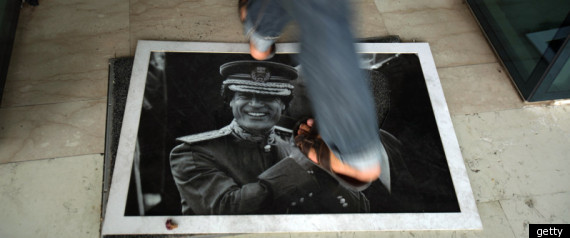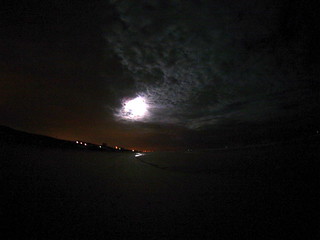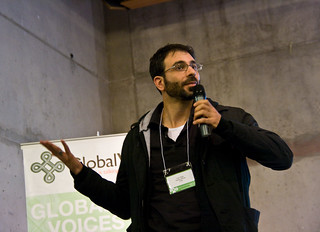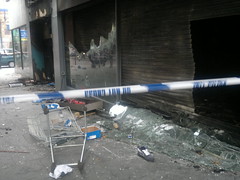 Lots of random artifacts come out in the mainstream media that once belonged to Gaddafi. Today I watched a home video where he sits on a couch and kids around with his grand children. There he is, grandpa Muammar who clearly loves his grandchildren, same guy who ordered the mass murder of political prisoners, same guy who thought it was a good idea to start the African Union. The Dutch newspaper ran a series of photos of the Colonel, from his rise to power as a young charismatic military man to his last few years looking like the political Michael Jackson. This is was no monster. Yet he did monstrous things.
Lots of random artifacts come out in the mainstream media that once belonged to Gaddafi. Today I watched a home video where he sits on a couch and kids around with his grand children. There he is, grandpa Muammar who clearly loves his grandchildren, same guy who ordered the mass murder of political prisoners, same guy who thought it was a good idea to start the African Union. The Dutch newspaper ran a series of photos of the Colonel, from his rise to power as a young charismatic military man to his last few years looking like the political Michael Jackson. This is was no monster. Yet he did monstrous things.
José dos Santos in Angola has been president for 32 years. He is, behind all the political pageantry, a dictator. But once upon a time, his party was the voice of reason under the brutal Portuguese colonial system. They helped liberate the country and went on to fight a civil war against what may or may not have been a madman (Jonas Savimbi). But here they are, 2011, the enemy of human rights and the antithesis of a party that was supposed to improve the quality of life for all Angolans.
Fidel Castro. Robert Mugabe. The ANC in South Africa. Bad comparisons? Perhaps. But the list of leaders and movements that started as heroes and later became something other than good to their fellow citizens is long. Whats more, it is often not possible for these leaders to recognize what they have become. They honestly seem to believe they are still doing what is right and fighting the good fight. Later some of these people are called monsters for the crimes they commit during their reign. But in reality, monsters are just people. Grandpa Muammar was Colonel murderer, and everything in between.
What we the observers of this world and the reporters that try to explain it all need to do, is not turn everything into some easy to swallow version of the truth. The truth is not black and white, it is grey. And by pretending it isn’t, we make it more possible for the same scenarios to keep playing themselves out. Yes, you might be the hero today, and that is wonderful. But remember, years later when you still think you’re the hero, you probably aren’t.

 I’m probably a very annoying person to deal with on a daily basis, especially when I’m doing my typical “big picture” speeches and appreciating the life I’ve carved out for myself knowing full well how many do not get to enjoy, travel, try… as I have. I’m not sure what turn of events, what influential person or piece of media that I ever heard/read/watched, that made me someone that continuously comes back to one conclusion: despite some slim odds and all the factors that could have played out differently, I have arrived (as have so many of us) at this point in my life doing things I love to do, having people in my life (near and far) that I’m honored to know, and in reasonably good shape as far as the essentials of life go. Although much of the world seems so busy and eager to move past these types of observations, just as quickly as someone might be about to click away from this text, I think the ability to see it – especially at difficult moments- is something that needs nurturing.
I’m probably a very annoying person to deal with on a daily basis, especially when I’m doing my typical “big picture” speeches and appreciating the life I’ve carved out for myself knowing full well how many do not get to enjoy, travel, try… as I have. I’m not sure what turn of events, what influential person or piece of media that I ever heard/read/watched, that made me someone that continuously comes back to one conclusion: despite some slim odds and all the factors that could have played out differently, I have arrived (as have so many of us) at this point in my life doing things I love to do, having people in my life (near and far) that I’m honored to know, and in reasonably good shape as far as the essentials of life go. Although much of the world seems so busy and eager to move past these types of observations, just as quickly as someone might be about to click away from this text, I think the ability to see it – especially at difficult moments- is something that needs nurturing.
 Lots of random artifacts come out in the mainstream media that once belonged to Gaddafi. Today I watched a home video where he sits on a couch and kids around with his grand children.
Lots of random artifacts come out in the mainstream media that once belonged to Gaddafi. Today I watched a home video where he sits on a couch and kids around with his grand children. 